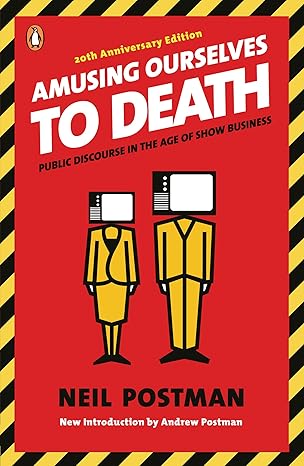A Brief Book Notice from Books At a Glance
It’s been twenty years now since this insightful and widely acclaimed book was released, and it’s long past time now that we catch up with it here on Books At a Glance. It’s an important work that impinges immediately on Christian values.
Watch for our Book Summary, and meanwhile, we provide some brief samplings below.
Table of Contents
1 The Medium is the Metaphor
2 Media as Epistemology
3 Typographic America
4 The Typographic Mind
5 The Peek-a-Boo World
6 The Age of Show Business
7 “Now…This”
8 Shuffle Off to Bethlehem
9 Reach Out and Elect Someone
10 Teaching as an Amusing Activity
11 The Huxleyan Warning
Quote & Unquote
- “Though one may accomplish it from time to time, it is very hard to say nothing when employing a written English sentence. What else is exposition good for?” (50)
- “As late as 1890, advertising, still understood to consist of words, was regarded as an essentially serious and rational enterprise whose purpose was to convey information and make claims in propositional form.” (59-60)
- “The problem is not that television presents us with entertaining subject matter but that all subject matter is presented as entertaining, which is another issue altogether.” (87)
- “I do not mean to imply that television news deliberately aims to deprive Americans of a coherent, contextual understanding of their world. I mean to say that when news is packaged as entertainment, that is the inevitable result.” (107)
- “Whereas television taught the magazines that news is nothing but entertainment, magazines have taught television that nothing but entertainment is news.” (112)
- “I believe that I am not mistaken in saying that Christianity is a demanding and serious religion. When it is delivered as easy and amusing, it is another kind of religion altogether.” (121)
- “Television, as I implied earlier, serves us most usefully when presenting junk-entertainment; it serves us most ill when it co-opts serious modes of discourse—news, politics, science, education, commerce, religion—and turns them into entertainment packages.” (159)
